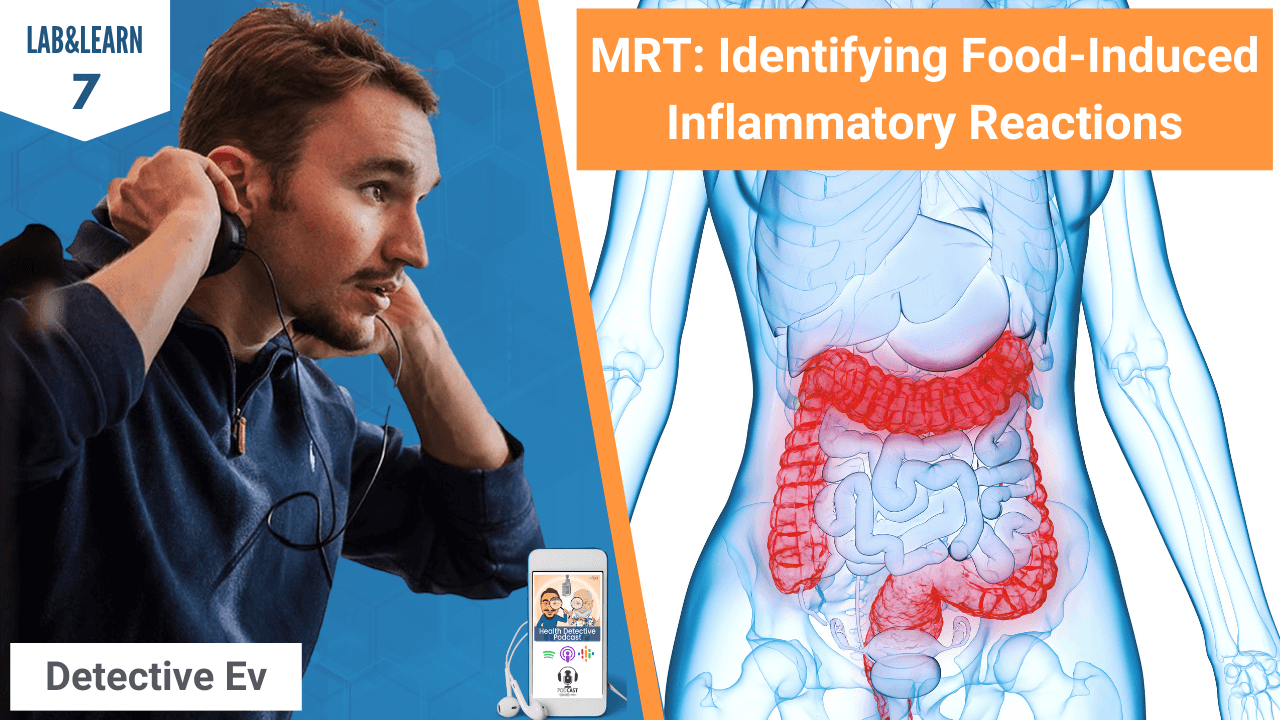Introduction
[00:00:00] Detective Ev: Hello my friends. Welcome back to another episode of the Health Detective Podcast by Functional Diagnostic Nutrition. My name is Evan Transue, aka, Detective Ev. I will be your host for today’s show on ulcerative colitis.
So, I graduated from the FDN course about six years ago. And I suffered with seven different conditions at the age of 18. And I’m thankful to say I do not meet the diagnostic criteria any longer for any of those things. In fact, I pretty much don’t have the symptoms of any of those things at all. So, I’m blessed to be able to say that. It’s led to my passion for this work, and that’s why I have the privilege of hosting this podcast for FDN, which is a program that certifies people in being able to get these results for other people and start a thriving business.

Today we are interviewing someone who is an FDN practitioner herself; it’s Tina Haupert. She’s also a certified nutrition coach, cookbook author, podcast host of a podcast called Carrots ‘N’ Cake, wife, mom, and the creative mind behind the business, Carrots ‘N’ Cake. Tina and her coaching team work one-on-one with clients utilizing functional testing and a macro-based nutrition approach to help them enhance their metabolism and diet to achieve their health and body composition goals.
Tina was diagnosed with ulcerative colitis 12 years ago and is also an active IBD advocate. IBD is irritable bowel disease for those that are not aware. Now what’s interesting about Tina’s story and what I really appreciated about her podcast is very often we have people on who are kind of in the same boat that I am. Maybe they don’t have the symptoms at all of the things that they’re dealing with.
Ulcerative Colitis: Still on the Health Journey
But I find it interesting that we catch Tina in, I wouldn’t call it the midst of her journey, but she certainly is farther than the middle. She’s within the journey, that’s for sure. And it goes to show this stuff is possible. You can get consistently better over time. It is my absolute belief that Tina will get to exactly where she set out to get to.
She’s had these conditions for a long time, you’ll find out in the podcast. We’re talking over a decade before lab testing got brought out and before protocols were really being intelligently done. And that’s a lot of the people that come on this show. We normally just catch them another 10 years down the road.
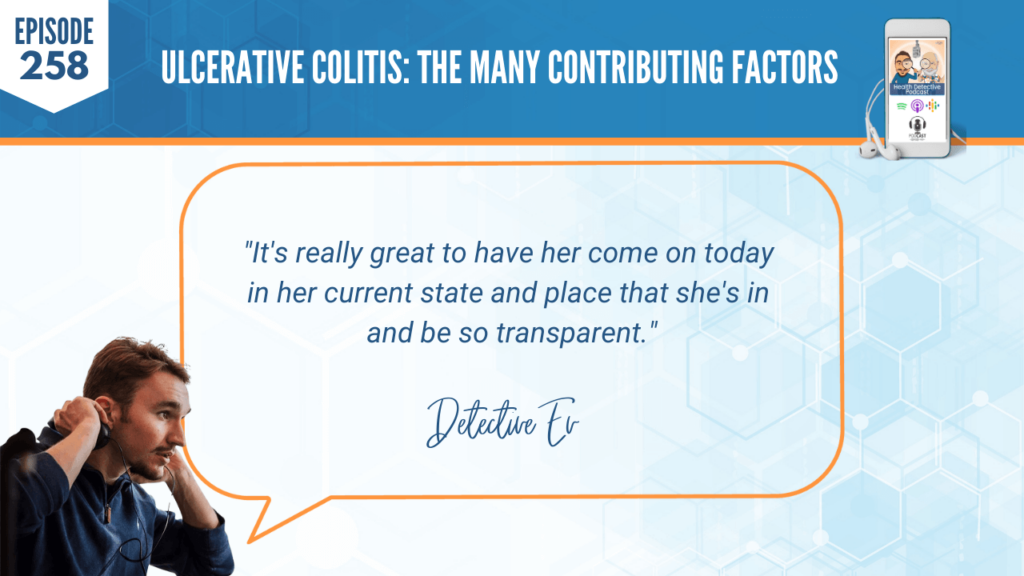
It’s really great to have her come on today in her current state and place that she’s in and be so transparent. I think it’s actually much more relatable for a lot of the people that might click on a podcast like this or listen to our show. Without further ado, let’s get to today’s episode.
Alright. Hello there Tina, and welcome to the Health Detective Podcast. How are you?
[00:02:35] Tina Haupert: I’m doing well. How are you? Thank you for having me.
[00:02:37] Detective Ev: I’m glad to have you. Actually, it’s kind of fun because we just got to do something on her podcast. So, before we get into anything else, I always shout people’s businesses out at the end, but we gotta get that going right away. So, where can people find the podcast? Because if they’re listening to this today or watching this, ours is well out. It’s been out for a couple of weeks already.
Ulcerative Colitis: Carrots ‘N’ Cake Podcast Focus
[00:02:57] Tina Haupert: My podcast is called Carrots ‘N’ Cake. It’s on all the usual platforms, Apple, Spotify. If you search Carrots ‘N’ Cake, you’ll find it.
[00:03:03] Detective Ev: And what are the typical topics that someone might expect to listen to on that? We love people listening to our podcast, but it’s like TV, you don’t just watch one show, you can watch a lot. So, what are some of the topics people can expect on there?

[00:03:15] Tina Haupert: In general, just women’s health. But there’s definitely a focus on hormones, healing your body, body composition changes, maybe a little bit of weight loss, but not crazy weight loss, more of the responsible approach to weight loss and changing your body.
[00:03:29] Detective Ev: Cool. I like that trend that’s happening. That seems to be something that we need to stick with ideally as a society.
So, how we will get started today, because as you guys already know, if you’re listening, you already heard the bio. And one of the things that you heard is that she is an FDN practitioner. What’s cool is I like to walk through these stories and journeys of getting into functional and natural medicine very similarly. You can ask similar questions, but the journeys are completely unique.
So, my first question that I’d like to start with today, Tina, is what we always typically start with on the show. When did the health stuff kind of start for you? Because it really goes one of two ways. You either had health symptoms yourself or someone very close to you that you cared about, had health symptoms. That’s been 99% of the people on the show. Whichever it was, when did that begin and what did that look like?
Ulcerative Colitis: Getting a Diagnosis
[00:04:13] Tina Haupert: Yeah, so this is part of my story. I was diagnosed in 2011 with ulcerative colitis, and at the time I felt like it came out of nowhere. I was like, how did I get this diagnosis? Then, obviously learning more about health and the body and doing the FDN certification, I had it coming to me as far as having GI issues before there, how I treated my body, how I lived my life, all of that hidden stress eventually came out in my body as far as GI issues.
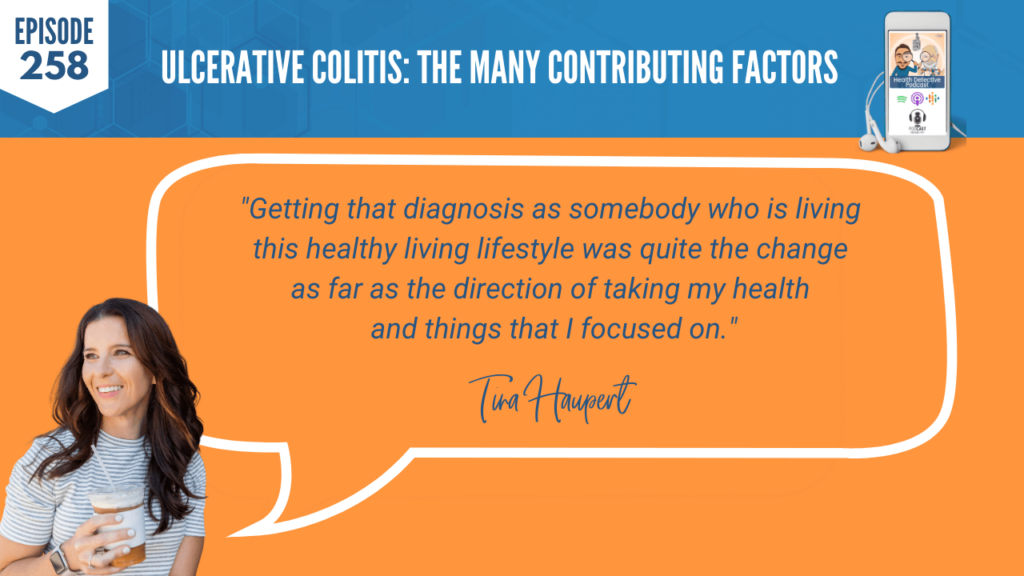
But yeah, it was also kind of interesting too because I got my start online as a healthy living blogger. I started my blog back in 2008 and really developed this incredible following. And getting that diagnosis as somebody who is living this healthy living lifestyle was quite the change as far as the direction of taking my health and things that I focused on. It was a really big deal at the time. Since then, I’ve really struggled with it. But finding FDN has changed my health for the better for sure.
[00:05:18] Detective Ev: Nice. Well, when these things happen, we do get a lot of people that are quote/unquote “into health” prior to getting the diagnosis or getting into FDN. And I think it redefines our entire definition of what health is or isn’t.
I remember as a kid, and I think many people, especially in America, still walk around with this definition, whether they say it out loud or not it’s kind of the bias in our brain. If someone’s thin they’ve done as much as they can on the food side, like they’re healthy.
Ulcerative Colitis: Could Food be the Culprit?

That stigma and stereotype was one of the biggest killers for me because I’ve never been someone who can gain weight easily, even in great health now. It’s still something that I would have to consciously try to do. And of course, there’s like 70% of people listening saying, oh, well it must be nice, right? Grass is always greener on the other side type of thing.
Because the opposite issue with that is there was nothing that society looked at when I was younger that said, this kid is unhealthy. These are just diseases that he has because he has bad genetics. Well, it turns out food could be something involved in weight. It could be something involved in the disease states that you have or diagnoses that you have. So, it’s complicated and there’s many things that go into this stuff.
Speaking of things that are complicated and how there’s many things that go into it, you had mentioned that prior to getting this diagnosis, now that you know better, you realize there were some warning signs. I’m always very interested in that because I think it can help people if we’re lucky enough to get someone listening before they’re in the ringer with all this stuff. You get the diagnosis in 2011, what was going on before that? Did you have symptoms five years before, 10 years before? What were those?
[00:06:52] Tina Haupert: Well, this is the thing that I think was so interesting about my journey, I ignored many of the symptoms. I was like, it is what it is. You know? Well, I know we love talking about GI stuff, but initially it was more constipation where I wasn’t going to the bathroom or having a bowel movement for a number of days.
Ulcerative Colitis: Ignoring the Symptoms
I didn’t think anything of it. It just is what it is. When my body’s ready to go the bathroom, it’ll go to the bathroom. And then I had the flip side where I had regular diarrhea that never got better. It was probably a good month or two of those symptoms. And I was just like, eh, things will get back on track. I’m not really worried about it. Living my life doing a million things, traveling, I just was too busy to focus on my health. So, I ignored all the symptoms until it got so bad that I couldn’t live my life. I had to see a doctor and get a diagnosis and all of that.
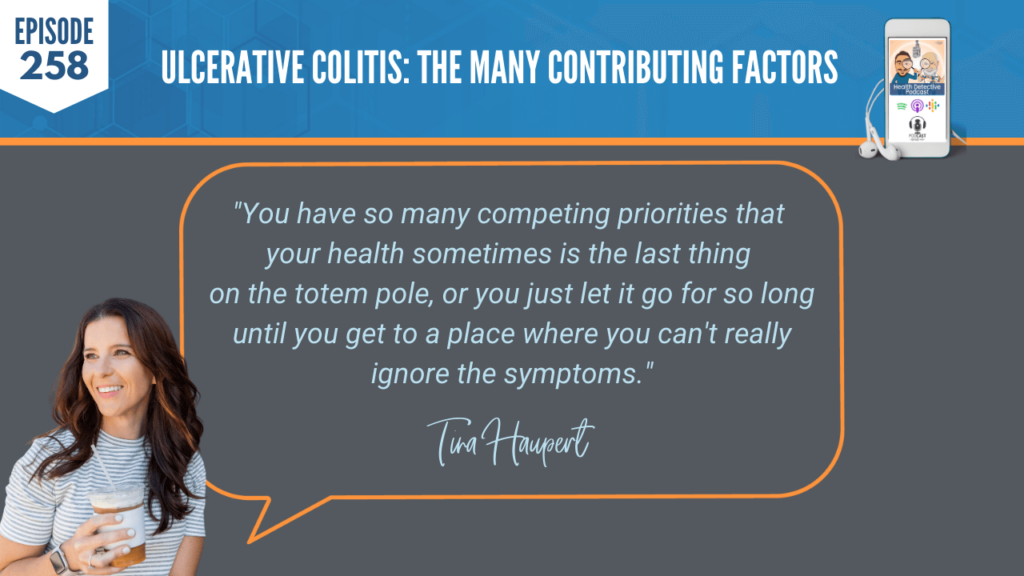
Working with women now, I think it’s the same thing. You have so many competing priorities that your health sometimes is the last thing on the totem pole, or you just let it go for so long until you get to a place where you can’t really ignore the symptoms. That was a hundred percent me.
[00:07:59] Detective Ev: Well, speaking on the idea of letting it go, at the same time, and correct me if I’m wrong here, because it could be unique for everyone. We don’t think about this so literally, cause we’re going about our day-to-day life. It’s not like someone says, oh, this is just normal. But the way we treat it, we almost, by definition, are acting like it’s normal. For
example, I had these stomach issues after I would eat certain things and so I would take Tums. But if you had asked me, is acid reflux normal? Maybe I would’ve thought about that more in depth and intelligently.
Ulcerative Colitis: Normalizing Warning Signs
At the time, I just took Tums cause it’s like, oh, you get acid reflux sometimes, like that’s what it is. Do you think you had that same kind of belief system up until the disease state, at least when you got a diagnosis? Was it, this is just things that happen to people, and you take something for it?
[00:08:36] Tina Haupert: Yep. And I was like, oh, that’s weird. Something would happen, and I’d be like, oh, that’s weird. But it wasn’t so bad that it gave me that inkling that maybe we should look into this a little bit. It was just, I was young. I was only 31 when I was diagnosed, so I went many years having these weird little health things pop up here and there.

But yeah, I would get a prescription for something, I would get better, and I would just move on with my life. I ignored it for so long it really did get to that disease state, like you said.
[00:09:04] Detective Ev: You’re one of these people that makes me so hopeful on a complete side note here. I won’t say it out loud, but I’ll do the math.
So, 2011, 31. It’s 2023 at the time of recording this. We have so many men and women that come on this show that do not look anywhere close to their age. I’m very surprised. I had no idea that you were in your forties now. And so, I’m very hopeful that I could stay good looking and healthy as I age in this.
I’m lucky I got into functional medicine stuff quick. Many of our guests have done that; it’s kind of amazing. And Reed Davis himself is the biggest testament, right? The guy’s like 70.
Ulcerative Colitis: When Sickness is Too Painful Not to Change
I was watching Reed’s wife’s Instagram story the other day as he’s wave boarding where he’s being carried by a boat. He’s lifted up on it and surfing on the thing. I’m like, this man is 70 years old. You know, the life expectancy in America is like four years greater than him and he’s learning skills that I can’t even get half our youth to do successfully. Probably cause we’re so messed up.
Complete side note. Get healthy, live forever and we all get to look good. It’s awesome.
So, with these warning signs that were coming, you perceived them as normal enough, normal enough that we’re not going to do anything. And then, all of a sudden, this diagnosis hits you. It’s a big learning lesson for anyone that listens. And we’re humans, so we’re not good at this. We kind of need enough pain that the idea of change leads us.
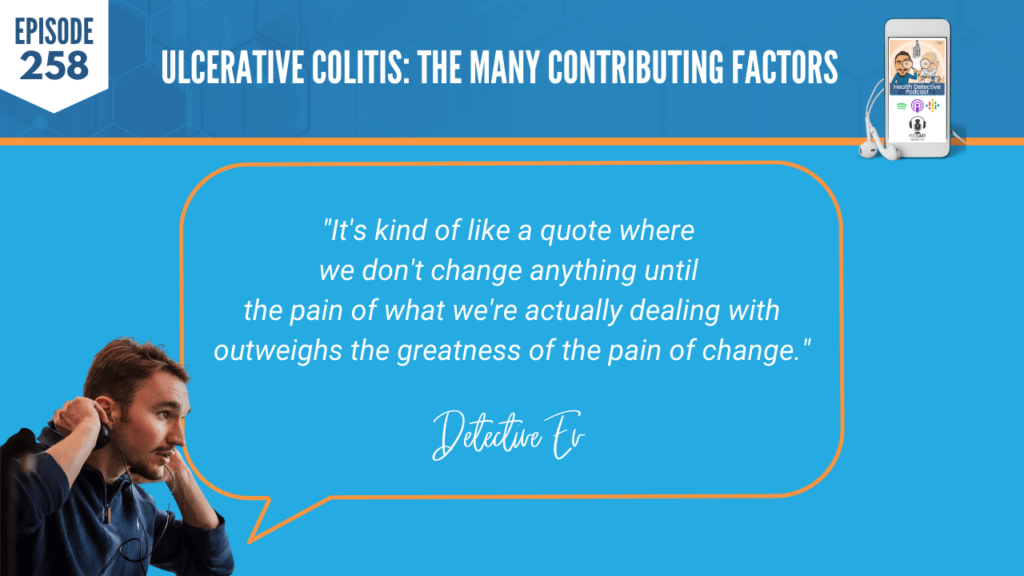
Well, how should I word this? It’s kind of like a quote where we don’t change anything until the pain of what we’re actually dealing with outweighs the greatness of the pain of change. Probably could have worded that much more eloquently, but you guys get the principle.
And for myself it was the same thing. I walked through life for 13 years, getting worse and worse and worse. And then we kind of all have our final straw. It might be a diagnosis. However, it might not even be the diagnosis though. I had like six other things diagnosed and I was still like, it’d be nice to not have these, but I’m just a sick kid. This is what happens. And then you finally get something where this doesn’t make sense.
Ulcerative Colitis: The Allopathic Method
So, initially you found this shocking because you have that healthy lifestyle already, or what you perceived to be healthy relative to other people, and it probably was relative to other people. When this happened, did you initially, like the first week, start looking at the health side or were you more responding in the Western medicine way saying, this needs to be treated, or whatever? What are the initial thoughts as you received the diagnosis?
[00:11:08] Tina Haupert: At that point, I was in a full-on UC flare, bloody diarrhea, urgency, so much inflammation that my doctor at that time, I have a different doctor now that I like a lot more, but that doctor put me on prednisone. Prednisone just calmed down all the inflammation and everything.

Things got better and I was kind of back at it. And honestly, I didn’t make too many changes in the beginning. I just was like; this is something that just happens. I’m going to take some medication and I’m going to be good. And I was good for a little bit, but I kept having flare symptoms. But I never really was a hundred percent.
My focus was diet right off the bat. You know, I went for the paleo diet, cut out all gluten, all dairy. Honestly, I never really got better. For me, as much as I want it to be the diet, and I’m a pretty healthy eater, I have tried every diet ever. You name it, I’ve done it. I’ve done the most extreme diets. But I think for me it really was managing the stress.
Ulcerative Colitis: Needing to Destress
As an FDN, we know all about stress and what it can do to the body. But it took many years for me really to get to that place of pain, and to that rock bottom, to be like, what you are doing is not working. You really need to get a hold of your stress.
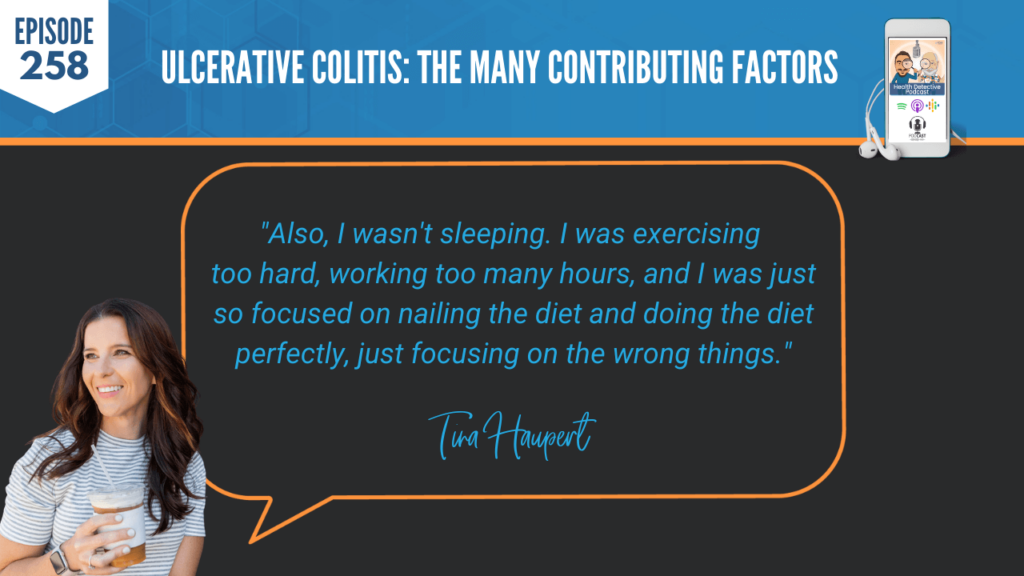
Also, I wasn’t sleeping. I was exercising too hard, working too many hours, and I was just so focused on nailing the diet and doing the diet perfectly, just focusing on the wrong things. And I really have struggled with this disease over the years.
I mean, I’ve been on all the medications, been off the medications, been back on the medications. And I really have just changed my perspective on health, to be honest. I know that wasn’t like a straight answer to what you asked me, but it really changed my thinking on literally everything when it comes to my body and my health and wellbeing.
[00:12:52] Detective Ev: That’s okay. I never give a straight question or a straight answer myself, so it’s all good. And it’s also why I like to do the organic free flow conversations here because we’re kind of touching on an interesting point. I very much appreciate your transparency. We never want someone coming on this show and acting like everything’s perfect.
Sometimes we do have people that have legitimately fully resolved things. I’m lucky enough to say, I don’t meet the diagnostic criteria for any of the seven conditions that I had. But other times it’s how do we get life as good as we can.
Ulcerative Colitis: Seeing Medication as a Tool in the Toolbox
Or what’s really interesting, and I don’t know how many times this has happened, but from my understanding, it has happened at least a couple of times. Sometimes the guest comes on and someone listening says, oh wait, I know exactly what to do for this. And then they reach out. The guest that’s tried a bunch of stuff has one new thing to try. So, it’s really cool how that works.
I actually have a sticky note for myself, and I always forget to do this on the show. We’re 200 something episodes in, and so it free flows a lot, which is great, but I need to ask more. Some of my audience members keep asking this, can we define the conditions a little better? Because, Ev, we’re not doctors and don’t know all this stuff.
Quite frankly, I couldn’t. I have an idea of ulcerative colitis; we’ve had it on before. But I can’t give some presentation on it. So, if you don’t mind me backtracking, let’s talk about what the heck is ulcerative colitis? What’s going on in the body when that occurs?
[00:14:05] Tina Haupert: It’s a fun one. But it’s literally ulcers, ulceration in the colon; and there’s inflammation in the colon. Doctors don’t know why it happens. Obviously, we have a lot of ideas. There’s no cure for it. And at this point, it really is symptom management unless you can figure out a holistic approach to heal your body.

That’s still the journey I’m on. And I’m glad you mentioned, even though I’m on this podcast talking about this, I’m still trying to figure it out for sure. I’m on medications, but I see medications as a tool in the toolbox.
Ulcerative Colitis: Doing What it Takes to Live Life
And I still eat really healthy. I sleep, manage my stress, take my supplements. So, it’s never one thing. But yeah, it’s been quite the journey to get to this place.
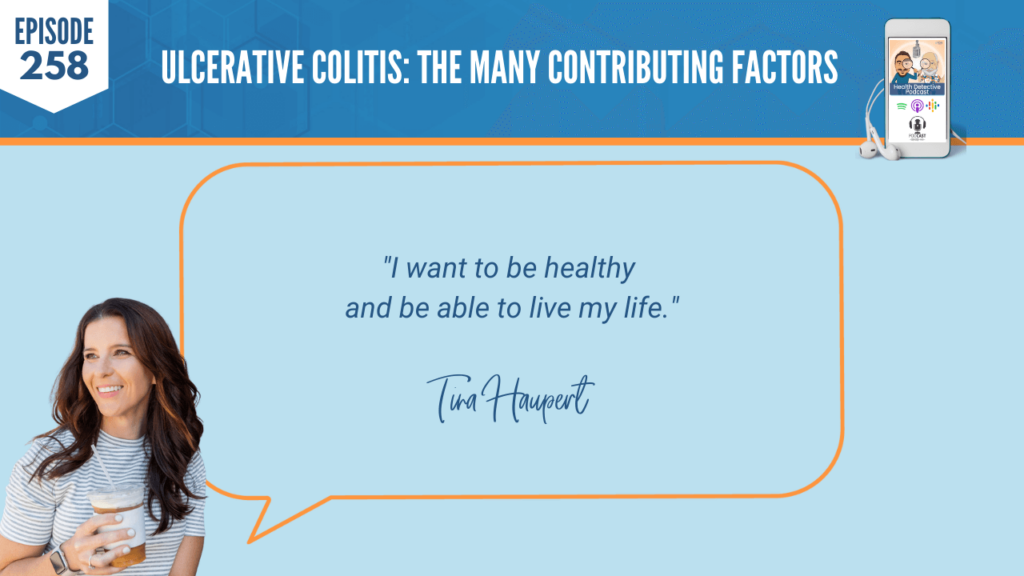
Because I really thought I needed to heal myself naturally and medications were just something I didn’t need. And I’m really at that point in my journey where I’m like, nope, I just want to be healthy. I want to be healthy and be able to live my life.
[00:14:59] Detective Ev: Awesome. That’s how this stuff should be used.
I constantly reiterate this just in case someone’s listening for the first time cause I don’t want to seem dogmatic. The one medication I still use to this day, and it’s not every time, but flying, I don’t think we were supposed to be 35,000 feet above the ground. That’s just my personal opinion. I don’t know about you guys; I wasn’t born with wings; I don’t do that. So, I still get very anxious about it.
I started to realize, Tina, that on longer flights, especially, and think about it, you’re traveling for work normally, at least I am. It’s usually never a vacation, it’s normally work. It’s fun. I enjoy what we do, but it is stressful. You’re changing time zones, got a conference going on. Now you’re indoors all day, when normally I have a better routine to get outside.
I was getting so stressed about the flight, so dogmatic of, I can’t take any medication for this, I gotta be better than this, I was getting colds, like the illness, every single time I traveled by the time the conference started. You’re like, well, how does that happen? Why do you get a cold?
Ulcerative Colitis: You Must Be Committed
For those that don’t understand what I’m saying, it’s that the stress was so bad, the immune system lowers. We’re exposed to these viruses all the time. It’s just you don’t normally get them if you’re healthy and doing what you need to be doing or you’re not under a lot of stress.
But I was like, okay, do I need to be the hero here? Or is it okay to say, hey man, you had seven different diagnosed conditions. You were using various medications and now you use one occasionally for something that you can argue human beings were never supposed to do. Hey, let’s work on this, try to make progress and see if we can get somewhere with meditation and other things. But this is okay, man, you’re doing good. This is progress. That’s really what it is. So, it kind of sucks.
Obviously, that’s a severe condition too. I think anyone listening can understand why you would want to implement the medication side.
If this was 2011, I know that we actually talked about this on your show, and I’m sorry that I forget. When did you find FDN? Cause it was quite a few years afterwards. I mean, this is down the road.

[00:16:45] Tina Haupert: So, I went for many, many years kind of ignoring this disease, not really accepting it. You know, I was taking meds, making changes to my diet, but really just not committed. I mean, you actually said this on my podcast, you have to commit to healing. You have to commit to actually changing. And I was always half in, half out. I didn’t want to disrupt my lifestyle and how I was living.
Ulcerative Colitis: Introduced to FDN
So, when things got really bad, it was probably 2019ish, right before the world shut down with Covid and everything. But there was definitely some times during that year where there was a lot going on in my life. I had worked with Kristen Thomas, who I know is a name in the FDN world. She introduced me to FDN.
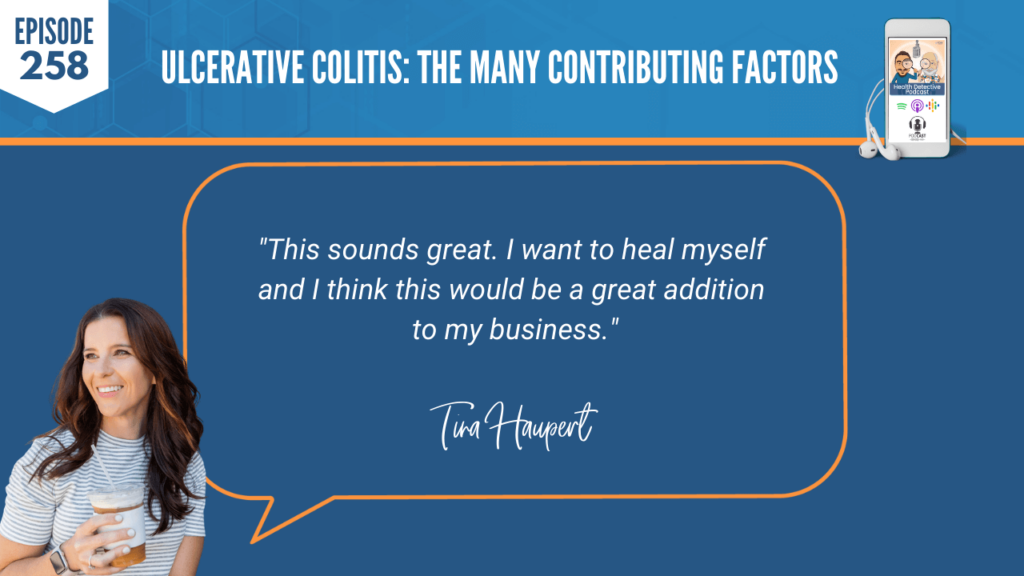
At that point, just knowing what she did and the things that we did together, I was like, wait, actually I want to do this. This sounds great. I want to heal myself and I think this would be a great addition to my business. So, I started the program in 2019, finished in 2020 in June when the world was officially shut down. But really that was kind of my turning point.
I mean, maybe it was because the world was shut down and I had more time to just focus on myself, but that was the commitment. That was, as I call that time, my basement days. My whole body was out of whack. It wasn’t just the UC. I was having hormone issues, had gained a bunch of weight, had acne everywhere. My body was just freaking out. I was getting headaches, I mean, just so many symptoms.
At that point, I was like, I have to get better. Thanks to FDN and the testing and just learning about stress, I think just knowing all the things that stress can do at our bodies, that was really the turning point for me. And ever since I graduated, I have been just slowly chipping away at all these different symptoms and hormonal imbalances and thyroid and all of that.
Ulcerative Colitis: Subtracting Symptoms Off the List

I mentioned on the episode we recorded; I have the Notes app on my phone. So, I listed all the symptoms I had, probably like 30 or 40 symptoms. And I go back to that periodically just to look at more and more symptoms I can knock off the list that I just don’t deal with anymore. So, even though I’m dealing with UC flares here and there, I’m a lot better than I was. It feels so much better, happier, energized, so many good things.
[00:18:54] Detective Ev: What you just said about the Notepad actually segues perfectly to the thing that I was thinking next. I didn’t understand the time difference, I don’t think, when we first recorded, or at least I didn’t remember it. In the middle of the day and there’s more pressure sometimes when you’re the one talking. It depends on the day. Sometimes I feel more pressure as the host. Other times it’s the opposite. I don’t think I remember as much of the podcast when I’m the one being interviewed. Like I just go somewhere else; it’s weird.
But my point in mentioning that is I forgot that you said the Notepad thing. Hold on for a second. We have before 2011 years of symptoms and warning signs. 2011 happens, eight years of the diagnosis. And you are trying, but obviously through no fault of your own, it’s not actually getting better.
So, 2020 is when you finally graduate and you’re noticing that symptoms go away more and more. It’s not the message that everyone wants to hear, but one of the things that happens with natural healing is, someone who has been able to talk to so many clients and so many practitioners on this show, healing does take time.
Ulcerative Colitis: Managing the Stress Piece
When you’ve had something for over a decade, it doesn’t always just disappear even in a year. Cause here’s the thing, you mentioned that stress is a huge part of this. Okay, you still have to work. I’m sure you probably do some type of workout routine, like there’s still life, finances, there’s life that exists outside of your disease.
So, when we’re talking about natural healing, one thing I always like people to remember is, what are we actually talking about? It’s almost a math problem. The lower you can get the stress, the more the body can engage in its natural healing ability.
The older we get, the worse this kind of is, right? An 80-year-old is not going to be able to heal as fast as a 40-year-old. And a 40-year-old is not going to be able to heal as fast as a five-year-old. We have a little more vital reserve, as we say in FDN; Reed always talks about that. But it’s really a ratio.
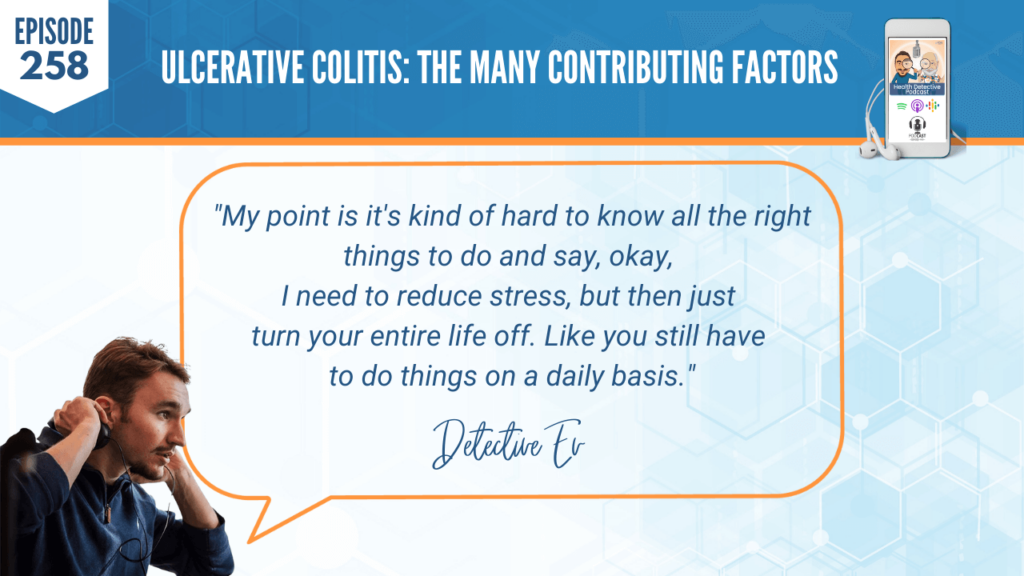
Cause if the stress is super high, constant trauma for the five-year-old, they might have more vital reserve than you or me, but they still get sick. My point is it’s kind of hard to know all the right things to do and say, okay, I need to reduce stress, but then just turn your entire life off. Like you still have to do things on a daily basis.
So, I would be really curious what happens to you in two or three years. Maybe you don’t need the medications and this stuff. Because maybe right now, that scale is like only 5% higher. Like the healing is only 5% higher than the stress, but you’re making progress. That notepad’s getting better all the time.
Ulcerative Colitis: It Takes Time to Heal
I remember that’s what happened with me with the skin issues. And to be clear, if I stress myself out, that’s still the first thing that will happen to me is I’ll get a breakout. So, it’s not that I’m free from it to this day, but that was like the last thing. I got 70% better in my skin in the first month of natural healing.
It must have taken three years, four years even, before I looked at my skin and noticed, Wow! I don’t have any breakouts today. Like my skin just looks good. That’s amazing for someone who, not to be gross, but this is actually true, probably had 200 breakouts at once on my face at one point.

So, that’s the progress guys. It takes some time to heal, right? It’s not going to be overnight. I’ll be excited to see what can happen to you in the next two or three years.
What are you working on right now? In addition to the medications, are you trying anything new, or do you just stay at a certain base level? What are you working on right now?
[00:21:57] Tina Haupert: That is a great question. So, I am in remission now thanks to some medications I’ve decided to take back in the fall. I tried so many things. You name it, I have tried it.
But I kind of got to this point where mentally, emotionally, it was really stressful on me just because I wasn’t seeing the results that I wanted. I was doing all the things and not getting a result. So, mentally, emotionally, I felt like I just needed a break from all the testing and everything.
Ulcerative Colitis: Focusing on Gut Health
Just last week I ran a GI MAP, so I’m waiting for those results. And yeah, I’m just going to continue to work on the gut health. Because now I don’t have any symptoms besides the UC. So, I don’t even really need to work on the other stuff. I mean, knock on wood. You know what I mean? My skin is cleared up, my hormones are balanced, my periods are regular. You know, all the symptoms that were happening in my health really have gotten better.
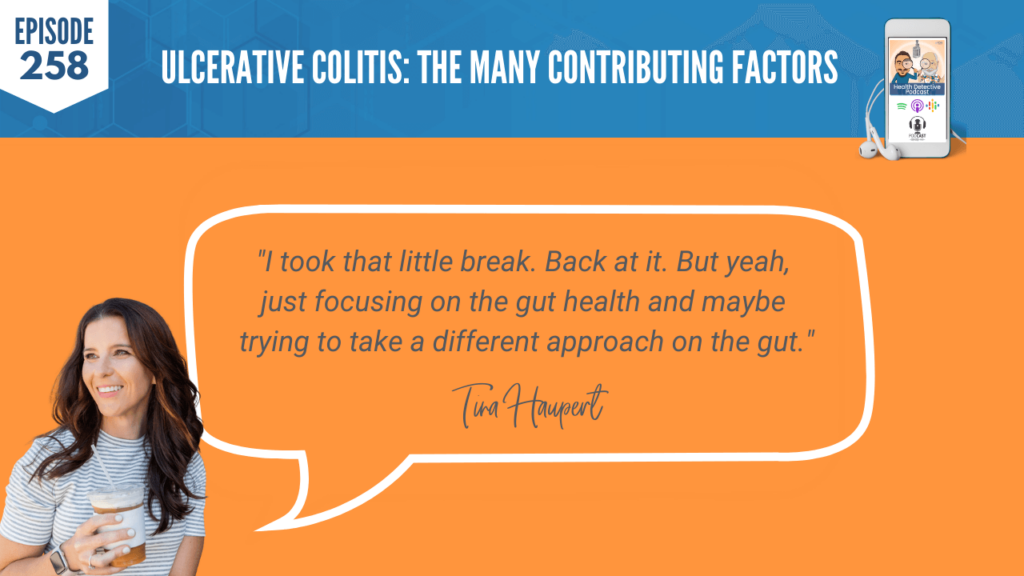
So, I took that little break. Back at it. But yeah, just focusing on the gut health and maybe trying to take a different approach on the gut. I want to see if I get any good clues from the GI MAP as far as moving forward. But, you know, I spent a lot of time on minerals, spent a lot of time on hormones, all that. And yeah, honestly, that’s like the last thing.
So, just to what you were saying, I wonder if I can figure this out in the next couple years.
[00:23:11] Detective Ev: The only thing that I’m a little hesitant to talk about is like cancers and stuff, so I’ll leave that off the table. But, almost anything else, and maybe I’m ignorant with this, maybe I am, but I believe it can be healed over time.
I just think what we need to emphasize properly, like, your story is the realistic story where this isn’t overnight. I try not to do this; we have too many people that get on this show and they’re 10 years in an intelligent, lab-tested backed healing journey.
Ulcerative Colitis: Slow and Steady Progress
I mean, technically in a sense, you’re really only a few years into this using the labs and all that kind of stuff. Yeah, you get someone 10 years in, it looks pretty dang good on the other side. They’re telling these stories and you hear the words, but it’s almost hard to connect to the emotional states or the severity of the issues back then. You’re like, this person’s telling some crazy stuff here. Like this was a lot of their life that they were really suffering.

So no, I think it’ll be figured out. I think you’re actually proving that. Look at what you just said, with a medication, now it’s in remission. And you have all these other symptoms knocked off. That’s slow and steady progress. And eventually slow and steady progress that doesn’t stop leads to maybe you don’t need the medication and you’re still in remission. I wish you all the best with that. That’s amazing.
What did you find on the labs, if you remember initially when you were doing FDN? Cause I’m trying to think, 2019, did we still only include two lab tests in the course back then? Did you only get the BioHealth stuff?
Tina Haupert: Yeah, I got the BioHealth stuff.
Detective Ev: So, you didn’t get the GI MAP or anything back then?
Tina Haupert: Nope.
Detective Ev: Alright. Well, then we didn’t have as many tools as we do now. For those listening that don’t know, we include like a thousand dollars’ worth of lab testing in the tuition now. But people like Tina and myself, we actually didn’t get that when we first went through.
Ulcerative Colitis: From A Disaster to Bazillion Times Better
So, if you remember from the hormone stuff, the BioHealth 101 back then, there’d be indican on there and stuff. Do you remember any of the stuff that popped up then? What were the hormones looking like and what was the indican looking like?
[00:24:59] Tina Haupert: Everything was a disaster for the most part. I’m throwing out all the big names, but I worked with Ryan Monahan for probably nine or 10 months. He ran everything on me. There was so much dysfunction. You name it, it was so out of whack.
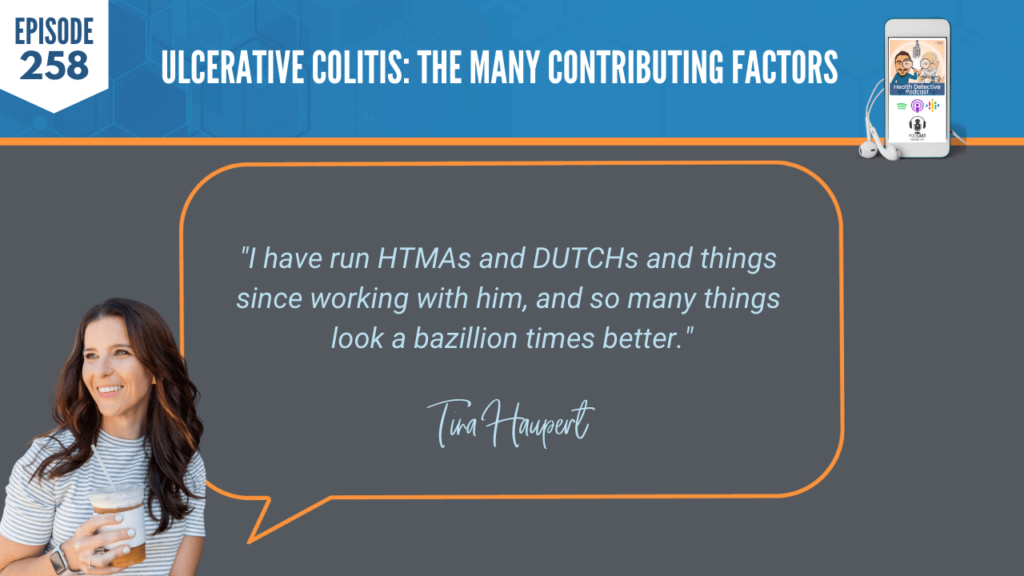
I remember doing review sessions and I was a brand new FDN. So, him talking about some of these things, I was like, oh my gosh. But working with him was almost like a mentorship because I learned so much. I have run HTMAs and DUTCHs and things since working with him, and so many things look a bazillion times better.
But yeah, you name it, all my hormones were tanked, my cortisol was tanked. Although, I remember running a DUTCH at one point and my cortisol was in fuego. And then as we know, high cortisol becomes low cortisol. I remember running that DUTCH and being like, oh, okay, this is what Ryan meant. When I was dealing with that low cortisol, I felt awful, zero energy.
[00:25:55] Detective Ev: Interesting. Yeah, Ryan Monahan, what a heck of a person to work with, with this stuff. You’re right, it is a mentorship at the same time because he has such an educational way of explaining stuff. You know what I mean by that. Someone could tell you what to do. A doctor tells you what to do. Ryan educates you on why you’re doing it, I think is what I’m trying to say.
Ulcerative Colitis: Being Patient with the Process
You do end up learning a lot at the same time, which is cool. But it’s also good. I’m actually really glad that you got to hear from someone like that so early into the FDN journey. Because on one end is it overwhelming? Yes, it is. But on the other end, I’m thinking, look at all these things that I can still try, all this stuff that I don’t know yet that can be applied to this condition.
Which leads me to the next question. For those that are out there dealing with this, because, of course, I’ll have ulcerative colitis in the title, and someone will click on it that’s dealing with the condition. You mentioned stress already, so maybe that’s the answer. But what are some of the biggest things, or the big thing, that you believe has most helped you in getting to where the condition’s at today, which is significantly better than when you started? What would you say are the biggest things that you’ve done that led to this success so far?
[00:26:59] Tina Haupert: Yeah, I think it was being patient with the process. Because I think there’s a lot of times I went into diets or trying new supplements with this desperation and urgency that this was going to be the thing that was going to fix me. And I think really changing that mindset, being like, this isn’t the thing that’s going to put you into remission.

You gotta do a few different things as far as how you approach your diet, your sleep, your stress management, the very holistic approach, basically D.R.E.S.S. I mean the D.R.E.S.S. protocol really just changed how I looked at everything.
Ulcerative Colitis: Nutritional Balance
But that mindset shift was really huge because now when I’m doing something it’s because I’m doing it for just my health, overall wellness, self-love. You know, you can put so many different words here, but it’s not that crazy desperation that this is the thing that’s going to throw me into remission, because that was really stressful and emotional. So, for me, I think managing the stress and the emotional part of it.
And then also, just a shout out for getting my nutrition in order. You know, in 2011 when I was diagnosed, I was very much eating diet foods, things that I thought were healthy. They were low calorie, had a lot of fake sugars, high fiber, like a lot of those diety foods. And I thought that was healthy.
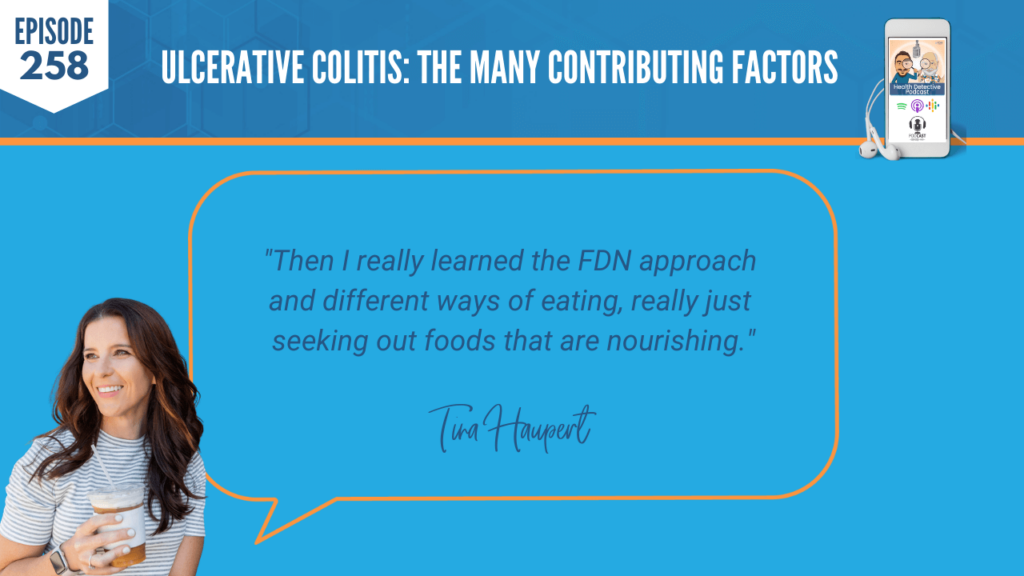
Then I really learned the FDN approach and different ways of eating, really just seeking out foods that are nourishing. I eat a lot of eggs, a lot of red meat, a lot of fish, and fruit, squashes, and things like that. So, just really amping up my nutrition and not eating in such a low-calorie diet way, but really trying to find those foods that are going to nourish my body. And as someone with ulcerative colitis, I already have issues absorbing food and nutrients and everything. So, just really focusing on the ones that are heavy hitters.
And then, I’m a big fan of the HTMA as far as mineral balance and whatnot. But I just feel so much better. You know what I mean? I feel like I used to be dragging my butt every single day, low energy, low mood. I’d be snapping at my dog, just little things like that.
Ulcerative Colitis: Needing a Mindset Change
I just wasn’t my best self. And I think now just really dialing in the diet, seeking out those nutrient dense foods, I just feel like a better version of myself, as cheesy as that sounds.
[00:29:11] Detective Ev: No, no, no. Absolutely. I love what you said about the mindset thing. Maybe many of us go through this, but I didn’t really realize this until pretty far into the healing journey, to be dead honest. But you’re right.

I remember for me, cystic acne was one of the biggest motivating things, despite all the other stuff I had. We want to look good; we want to feel confident. And I’m no 10 out of 10 on my best day, so I really can’t deal with cystic acne. I needed to get that going and get it away. And so, when I’m going through that, you’re right. The whole idea was this thing is going to be the thing that cures this or fixes this. It’s this diet; it’s this, whatever.
And then no one really gives you a rule of thumb for, well, how long should it take? So, I go Paleo. I mean, I have the common sense to know that UC or cystic acne’s not going to disappear in one night of paleo. But is it supposed to be 30 days or is it a year? And when should I try something else? When do I say that this doesn’t work if I don’t have this timeframe?
That’s why I wanted to emphasize that great part of your story where it’s like, no, this does take time. You can’t just change the diet overnight and then all of a sudden expect symptoms to go away.
Ulcerative Colitis: One Symptom
You might occasionally find that certain foods with certain conditions are so triggering that you feel like 80% better, yes. But I could eat nothing, I could fast, which is a hugely healing thing, and acne’s not going to disappear overnight. You’re still going to have it.
We’re talking about something with your colon, that’s being used constantly. I’m actually guessing that’s one of the issues with your condition is that maybe you are doing everything right, but the colon still needs to be used every day. And if you have these ulcers, that’s pretty bad. They’re going to get kind of pissed off, I guess, anytime something goes through there. I feel like I’m oversimplifying the condition, but you know what I mean?
Let’s say I had a stomach ulcer. If I’m constantly eating food, which I kind of need to do to live, that’s probably going to piss off the ulcer a lot of the time. So, it’s a nasty little thing. It’s self-fulfilling.
Did you ever get any other diagnoses, or did it just end up being the UC and then all these other symptoms that you had, but no other diagnoses?
[00:31:07] Tina Haupert: Yeah, just the ulcerative colitis was the only diagnosis. And I’ve done colonoscopies, endoscopies, and stool samples. I’ve done all the things, but that’s pretty much the diagnosis.
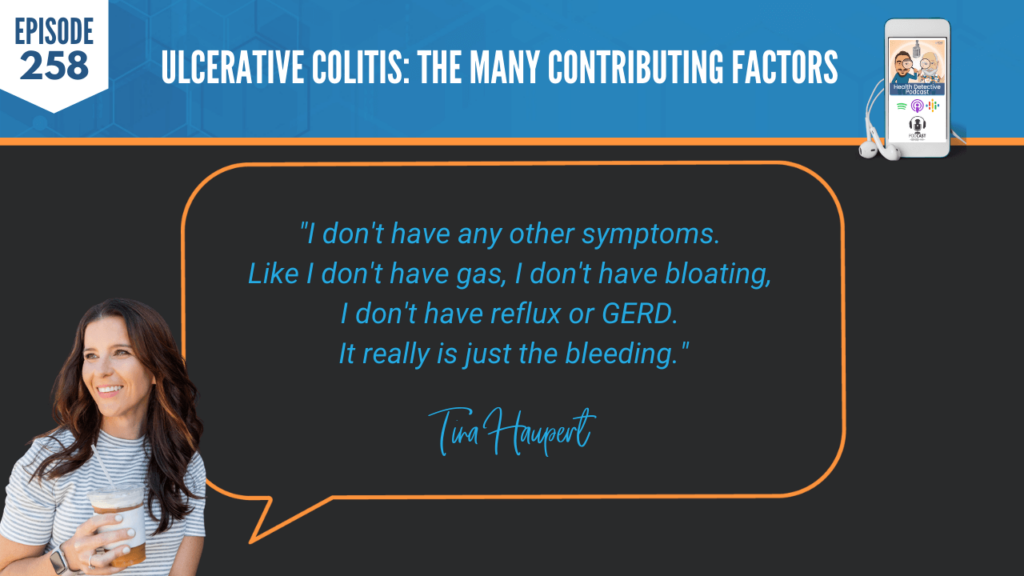
Although if anybody’s listening, I feel like I have a weird version, or maybe it’s just me. But I don’t have any other symptoms. Like I don’t have gas, I don’t have bloating, I don’t have reflux or GERD. It really is just the bleeding. And I’m always trying to figure out why, you know, why is that the thing?
Ulcerative Colitis: Calm as a Duck
And just like what you were mentioning, when I was working with Ryan, I did the elemental diet where you just drink your nutrients. So, just giving the colon time to rest, I didn’t get one bit better, not even close. Actually, I think I got worse, and I did it for 13 days. It’s like not eating. And I don’t know, my colon just wouldn’t heal. It just, I don’t know. I’ve tried everything.
[00:31:55] Detective Ev: You mentioned the stress. A recording’s completely different than your real life. You actually come across as someone very calm, very in control of your words too.
On podcasts, I do this myself. You know, you kind of get lost in your head, and then you have to refocus, whatever. But you don’t strike me as a stressed person. Again, the recording’s completely different than people’s real life.
You’ve said this multiple times now that reducing the stress, and you meant, it seems, like mental emotional was one of the biggest. Can I ask? What was life like? Like what was going on that was so stressful? Or was it just the way that you perceived life?

[00:32:26] Tina Haupert: Yeah. So, my husband always jokes, I’m like a duck. If you see a duck on the water, they’re so calm floating around, but then their feet are paddling like crazy.
[00:32:33] Detective Ev: I was wondering where we were going with that. But, okay, got it.
[00:32:36] Tina Haupert: Yeah, so I’m like a duck.
But yeah, just running my own business, I’m type A personality, perfectionist. I do have a little childhood trauma stuff that I’m still working out too. But I’m just one of those people. I just work; I love work.
Ulcerative Colitis: Positive Results from a Lot of Changes
So, I find a lot of self-worth in my work, achieving, and all the things that go with running a business. Honestly, I was just working way too much. Then also during the early diagnosis years, I was running marathons. So, it was just this added physical stress. And then I was a CrossFitter and doing a lot of CrossFit. Kind of like, work hard, play hard too, as far as my life.
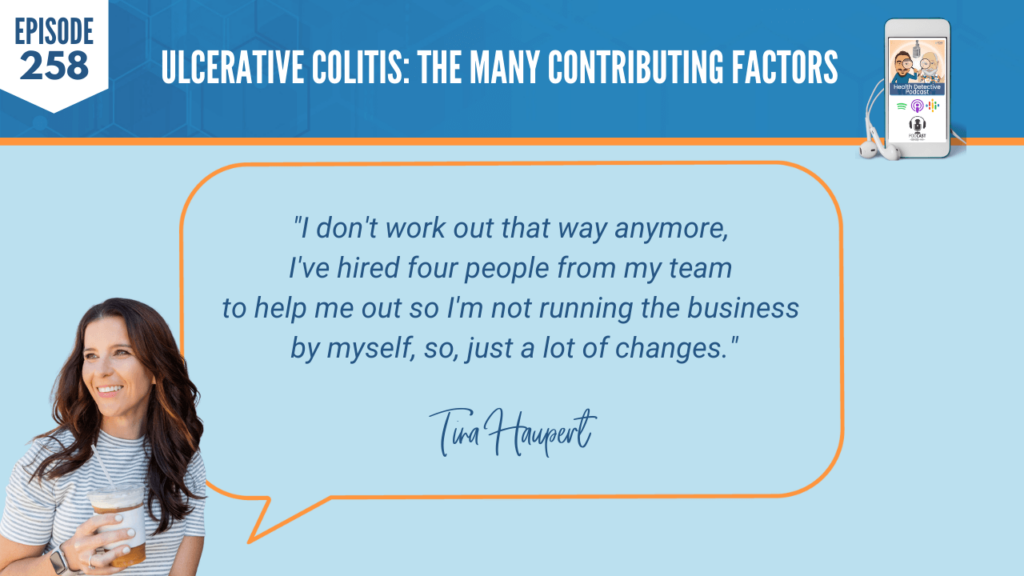
And I’ve just changed so many things. I don’t work out that way anymore, I’ve hired four people from my team to help me out so I’m not running the business by myself, so, just a lot of changes. And even just prioritizing sleep, I was somebody that was like, I don’t need sleep. Five hours, that’s plenty. And now, I really try to get eight, nine hours of sleep a night. Even that has made a huge difference as far as my mood, my energy, my blood sugar.
[00:33:35] Detective Ev: Now we’re really painting the picture here. I’m starting to get Tina off-air. This makes a lot more sense.
And yeah, I hate to burst anyone’s bubble, but we’re here to talk about the truth, not make people feel good necessarily. I want them to feel good with the truth. But you guys should look up the life expectancies of marathon runners cause it’s not the picture of health that you might think. I’ll put it this way, it’s actually less than the life expectancy of the standard American. Kind of crazy. But that’s not anyone’s fault, because society tells us that person’s the epitome of health to be able to go do something like that.
Ulcerative Colitis: A Misconception of What is Healthy
No, they’re the epitome of an endurance athlete. That’s not necessarily the same thing. That means they’re very good at that one task.

When I see these ultra marathon runners, I have such a high respect for that discipline. And I’m sure with your type A mindset that you described, there’s always going to be a part of us that’s like, dang. I get you and I respect that grind, but at what cost? It’s like, holy crap, that’s an insane thing to put the body under. They’re like, I’ve been up for 24 hours running. If I stayed up for 24 hours right now, I’d feel like crap, let alone putting on whatever many miles you do in 24 hours. That’s nuts.
The last thing I wanted to ask really quick, just before we talk about what you do, where people can find you, stuff like that, is you said you’ve ran a stool test. Did anything crazy come up on that or was it kind of standard stool test? You know, there’s typical things that come up. But I was just wondering, I’m really fascinated by what the microbiome might look like and if there’s any pathogenic stuff going on in someone with UC. That’s why I’m asking.
[00:35:04] Tina Haupert: The last stool test I ran was 2011. I was actually looking at it just because I did one last week and I’m anxiously awaiting the results. But I have done so many H. Pylori protocols; I cannot get rid of it. I have done every version of every protocol. But I remember H. Pylori.
Ulcerative Colitis: A Healthy Mindset
I had low SIgA, which made sense. Cause during that time I was just getting every sickness that my son had. He was a toddler at the time, so, whatever he had, I had. I was just getting sick all the time.
I’m sure the zonulin was super-duper elevated. And yeah, I think there was a few things that were kind of high and low, but that’s having UC. I mean, there’s just things off. But I’m very curious to see what this new GI MAP is going to say cause it’s been a while. It’s been a couple years.
[00:35:47] Detective Ev: I hope it provides insights for you to just continue. I love that you keep trying stuff. That’s really what it is.
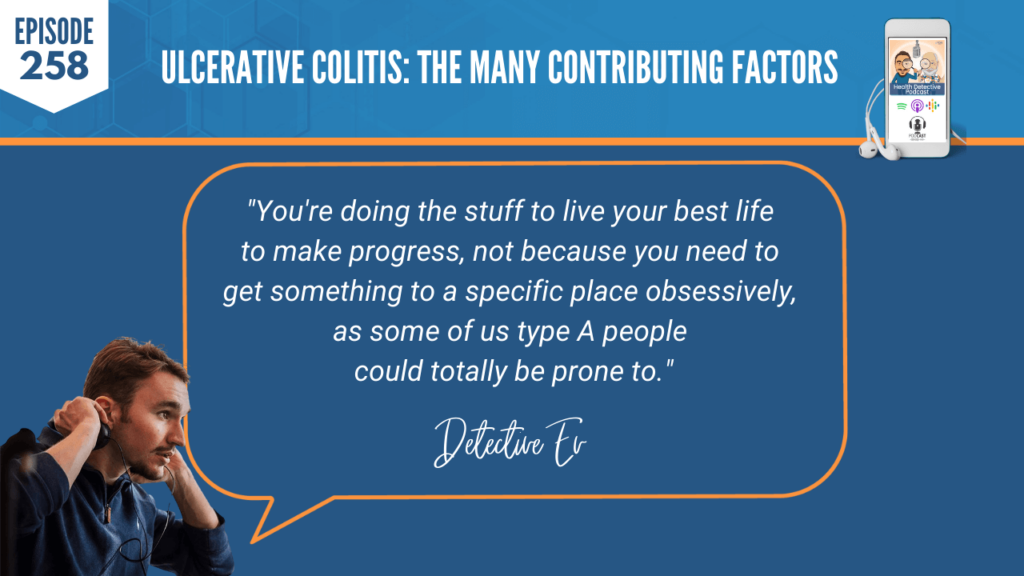
You have the super positive mindset around it, healthy would even be a better word. Not that it’s not positive, but healthy is actually more important in this sense, right? You’re doing the stuff to live your best life to make progress, not because you need to get something to a specific place obsessively, as some of us type A people could totally be prone to. We gotta be careful with that.
So, what do you do now? I mean, you obviously have the podcast. But what does the rest of your life and work look like? Cause I know it’s involved obviously in this space to some degree.
[00:36:24] Tina Haupert: Yeah. So, I’m the owner of Carrots ‘N’ Cake. I still do the FDN thing, but I’ve also hired another FDN. So, I’ve thrown out all the big names, but Jennifer Woodward is part of our team helping me out with protocols. I know all the big people.
Ulcerative Colitis: A Realistic and Sustainable Approach
Anyways, I have a small team of coaches and FDNs that help me out. And we work with women who are, I would say 35 plus, a lot of women who are looking to lose weight and change their bodies.
But as I mentioned in the beginning, we take a very responsible, sustainable approach to fat loss. Because, as I always joke around with our clients, I can have anybody lose weight. We just put you on a crash diet. But really, the issue is what happens after that diet? How do you maintain those results? So, that’s definitely a focus of probably like 90% of our clients that they want to lose weight in some capacity.
But we have a number of women who come to us that have hormonal issues, thyroid issues, gut issues, blood sugar issues, things that might be preventing them from losing weight. We use the functional testing to help really get clear on what is happening in their body and use that data as far as clues in creating kind of a plan of attack what they should really focus on.
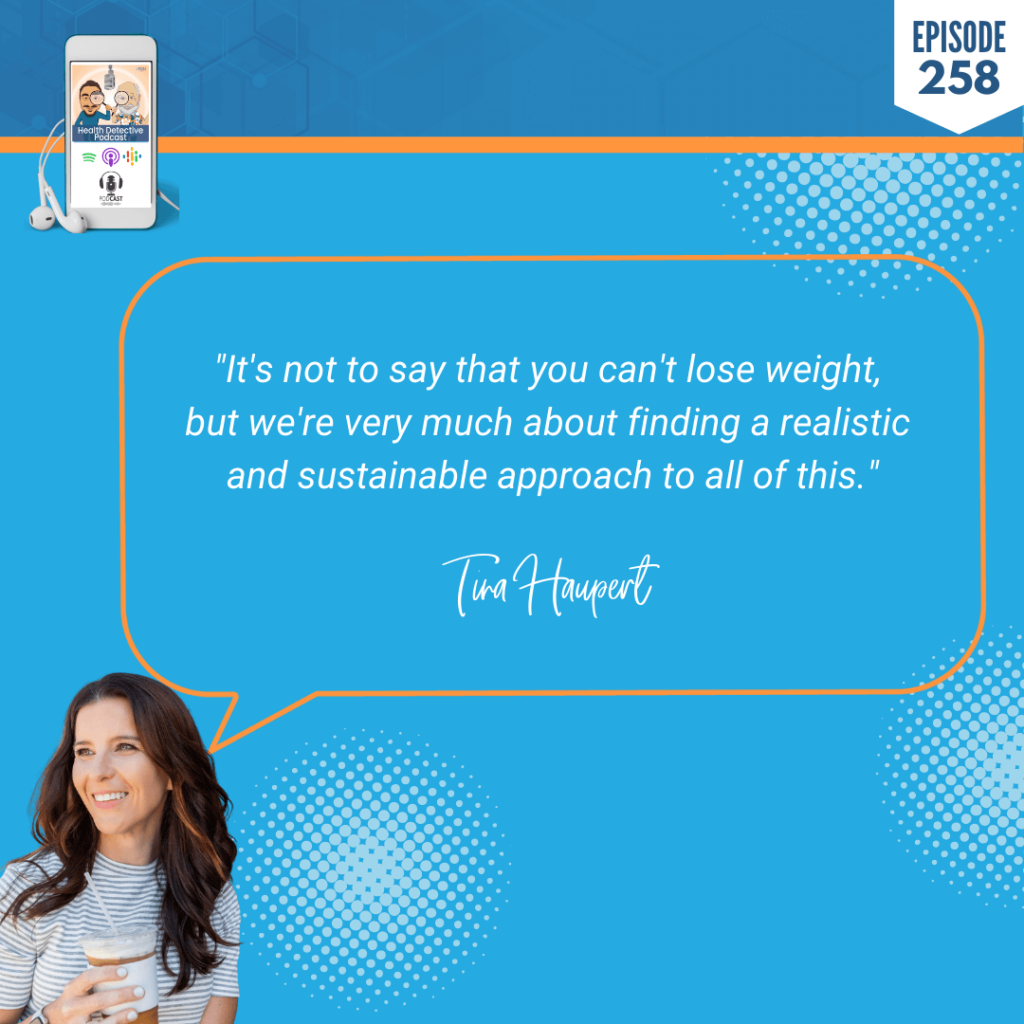
Because if your thyroid is out of whack or you have blood sugar issues, it just makes losing weight harder. It’s not to say that you can’t lose weight, but we’re very much about finding a realistic and sustainable approach to all of this.
And of course, our team is all moms, so I think we work with a lot of moms who have kids and they’re working full-time. But just really having that realistic approach in the sense of like, what are we doing today? What are we doing tomorrow? Like really coming up with a step-by-step plan for our clients.
Ulcerative Colitis: Clients’ Stress Factors
If you’ve ever done a review session after running all these tests, it’s kind of overwhelming. There’s a lot of information, a lot of education, a million things that you could do. We really just try to simplify things for our clients and make it easy for them, focusing on one thing at a time and really progressing them through our program.
[00:38:17] Detective Ev: That’s great! Jennifer’s fantastic! She’s actually a fan favorite on this show. So, I’m sure people will love knowing that they at least have the possibility of getting involved with her if they’re working with you guys.
I’m always curious about this too. These are my favorite parts of the show to some degree. Clearly, if you have other coaches, you’ve worked with a great handful of people at this point, a lot of people probably come through the business. And so, I’m curious. Do you have any, to the degree that you’re able to share, there’s privacy and stuff, but do you have any cool client testimonials or really amazing stories of someone that came through? Maybe they were at the end of their rope, and we were finally the people that were able to help them.
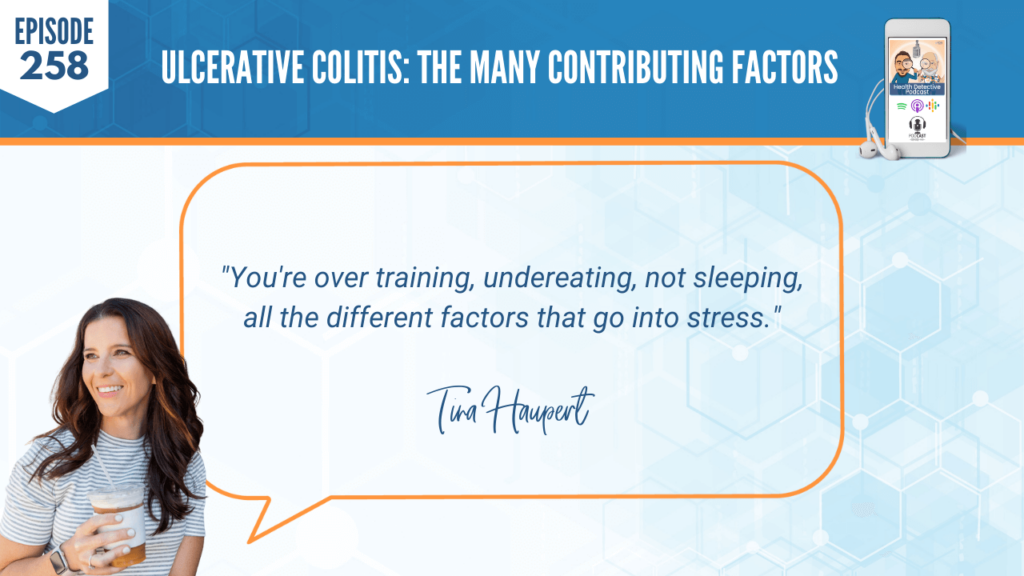
[00:38:52] Tina Haupert: Oh yes, for sure. I think it’s like the type of person that we attract, but type A, perfectionist, doing all the things. But we’ve had a number of clients where they can’t lose weight, they don’t feel great. And a lot of times running these tests and showing them that their body is stressed out, I mean, there’s so many different markers that will just show that you are doing too much. You’re over training, undereating, not sleeping, all the different factors that go into stress.
Ulcerative Colitis: Removing/Balancing Stress
Especially with ladies trying to lose weight, data can be really helpful for them making lifestyle changes. And a lot of times it is eating more, exercising less, taking that stress off your body, and just seeing your body composition change for the better. So, it happens all the time with our clients. We actually have a few different case studies on the Carrots ‘N’ Cake podcast you can hear right from these ladies how this transformation went down and exactly what we did.
But it’s really helpful running the DUTCH test, or the HTMA, or a GI MAP or something like that to get that data and be like, okay, we need to focus on X, Y, and Z if you really want to feel better, improve your health, and ultimately lose weight. It’s fascinating. I just love the testing and I think it’s so helpful for these ladies.
[00:40:04] Detective Ev: Nice. Well, this concept’s come up many times in this podcast already where at one point you’re talking about mental and emotional stress, work stress, labs, all this stuff. I’m oversimplifying it a bit, but at the end of the day, that’s really the core principle of FDN is removing stress.
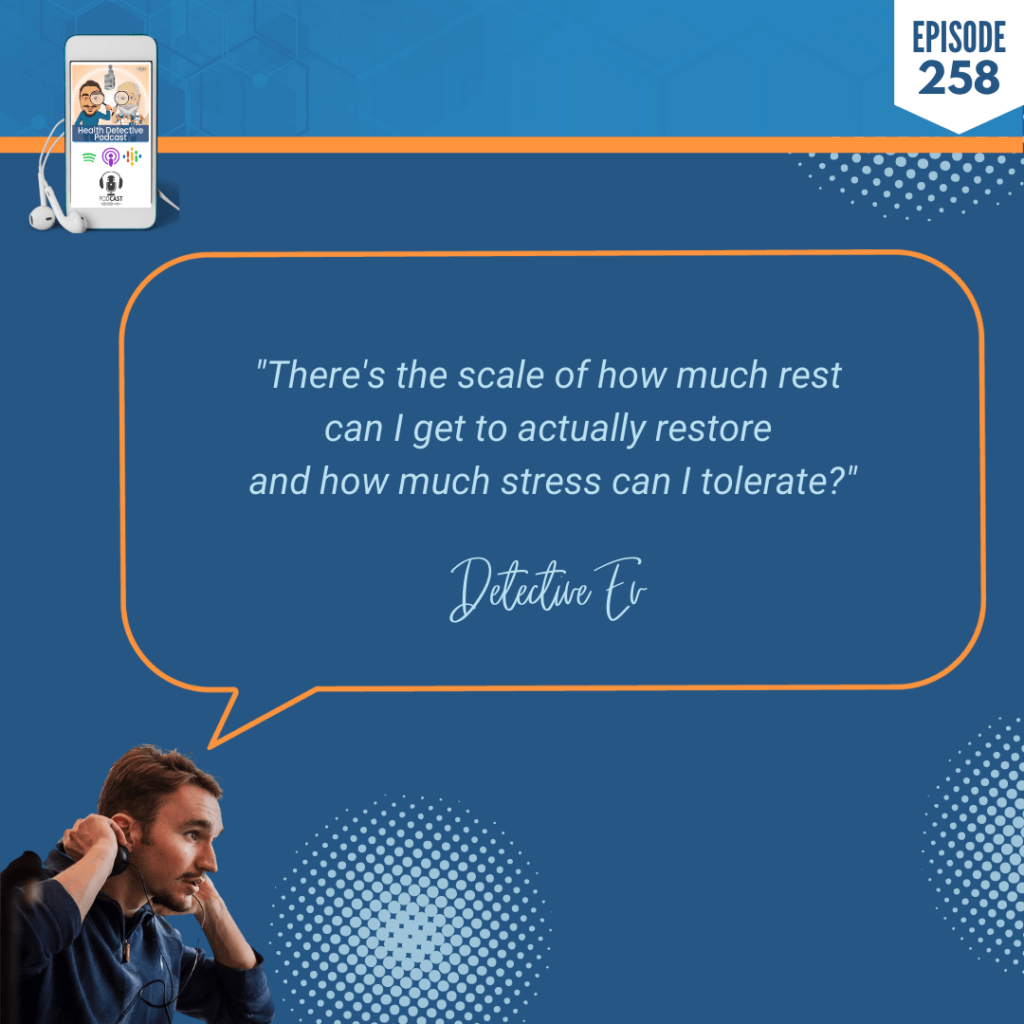
Now, the labs are great at identifying what we call HIDDEN stressors: hormonal, immune, digestion, detoxification, energy production, nervous system. I wonder how many times I’ve said that in my dang life, you know? But it’s all about this balance like I was talking about. There’s the scale of how much rest can I get to actually restore and how much stress can I tolerate?
So, I’m in the same boat. I love working; I work all the time. To be able to do that though, everything else has to be just about perfect.
Ulcerative Colitis: Trading Off the Stress
We just traveled for FDN last week, go a different time zone, all this stuff. It was 7:30 AM to 9:00 PM every day; it was ridiculous. And I could feel what was happening in my body.
I’m sleeping in a place I’m not used to, I’m not really able to get the foods that I know fuel me best. Now I don’t mean it in a quality or like orthorexic way. It’s just, I wasn’t able to get the amounts that I need because we were so dang busy. And again, sleeping in a different place, the time zone jump, all that stuff, I can already feel it. If I did this every day, this wouldn’t work for my body. So, it’s kind of a good message. You can pick your stress.
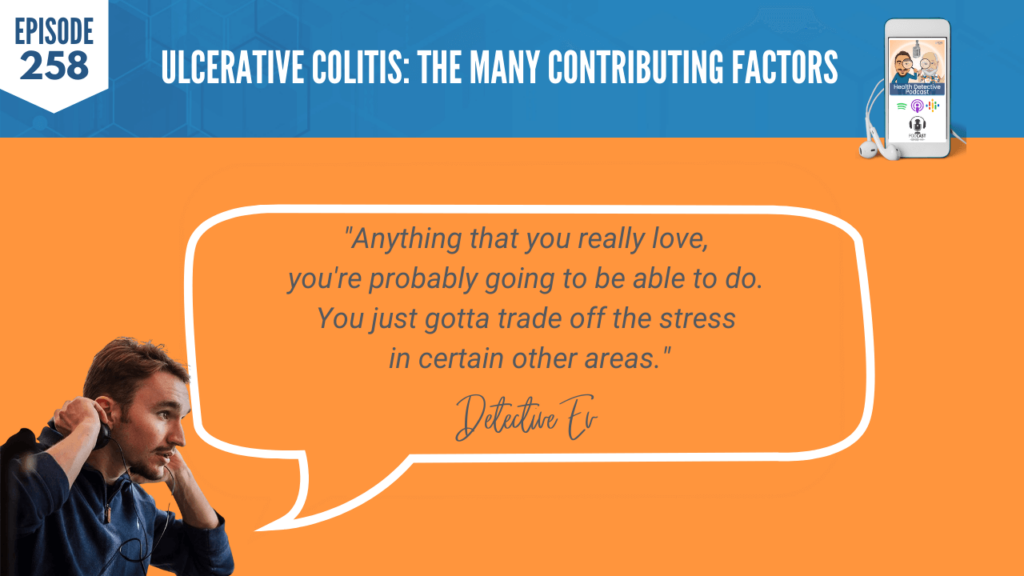
Anything that you really love, you’re probably going to be able to do. You just gotta trade off the stress in certain other areas. That’s why there are people still to this day, although I don’t recommend it, like my dad out there smoking cigarettes and living his best life because he’s fairly low stress.
He works outside all day, he’s extremely physically active, that sun has been hitting that man’s body 12 hours a day for 30 years. Most of us cannot say that. I can’t say anything close to that because we work indoors. He picks his stress. Again, I wouldn’t pick it. It’s like, how do these people survive in today’s world?
I think a lot of our clients ask that. How are they able to do that but I’m doing all this stuff right and I can’t get better? You know, how is that, cause you pick your stress? Well, some of the times the stress is hidden, and we haven’t directly picked it.
Ulcerative Colitis: Demographic Lab Patterns
Oftentimes, the type A personality is a factor here. Because if type As and type Bs are roughly distributed about 50/50, that’s not how it works in our practices, right? Type A is like 90% of the people that are FDN practitioners or that work with FDN practitioners.
You’re like, well, why does that happen? Is type A the problem? No, but it’s a risk factor in addition to all the other stuff that’s going on in today’s world. If I hit a type B personality with glyphosate versus a type A personality with glyphosate, the type A is going to get sicker faster every single time. That’s just probably what’s going to happen. So, it’s great to know that you’re doing this work and helping many individuals.
One other fun question I like to ask about the labs is, do you find in the demographic that you’re working with any similar patterns on the labs? Are they coming to you at a certain place, hormonally? Do they have certain mineral imbalances?
[00:43:00] Tina Haupert: Oh yes, again and again, for sure. And there are a lot of things that could hinder that fat loss or just feeling your best.

We see estrogen dominance a ton as far as women in perimenopause and 35 plus. And we see the four lows pattern quite a bit on the HTMA just because we work with a lot of moms. After pregnancy and breastfeeding and working full-time with kids and you know you’re exercising, there’s so many reasons for your minerals to be depleted. But those are the ones that we see again and again for sure. Maybe some other markers that could contribute as well as far as clues for blood sugar and thyroid and things like that.
Ulcerative Colitis: Sleep and Talk Therapy
[00:43:37] Detective Ev: I always encourage listeners to work with whoever comes on. Obviously, lab tests aren’t free, our services aren’t free. And every now and then, there’s people that hop on that were basically like me at 20 years old. They don’t have a dime to their name, they’re trying to figure this out. And they’ve wasted a lot of money on the health stuff already.
If you had to give the best piece of free advice, free action to someone specifically with UC, is there anything that comes to mind that maybe they could take away and implement immediately from today’s podcast?
[00:44:17] Tina Haupert: That is a good question. I would say, free, free would probably be to get to bed and sleep. I’m also really into breathing and just taking time to breathe.
But if you had a little bit of money to spend or insurance that would cover it, I would say some sort of talk therapy. That really has been life changing for me, just how I view things, my relationship with medications, and also just how I view this disease in general.
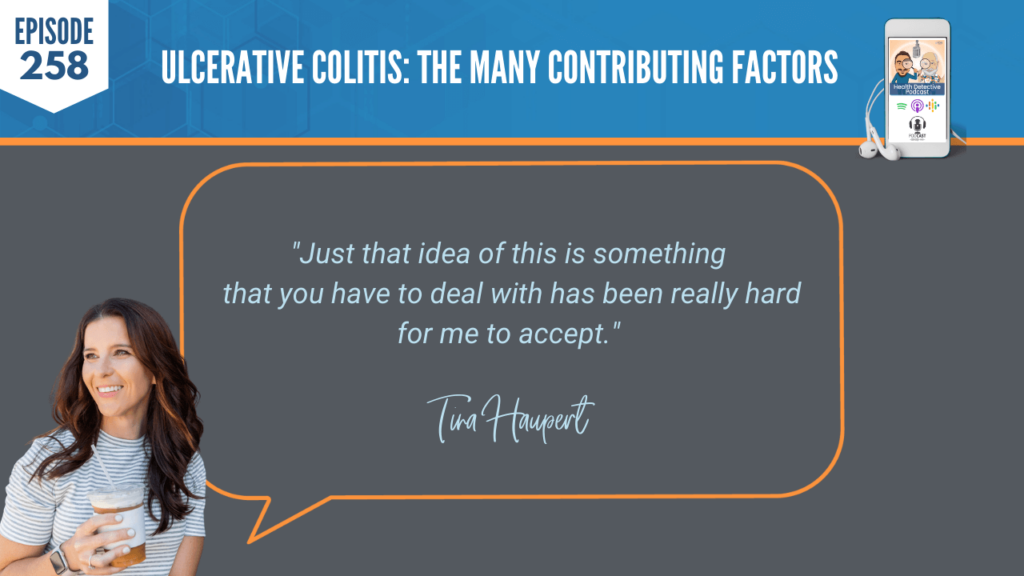
Because when you’re diagnosed with a chronic disease, you have to deal with it forever, or you have the potential of dealing with it forever. I mean, obviously, I want to be in remission forever. But just that idea of this is something that you have to deal with has been really hard for me to accept. And I think that’s why I ignored it for so long. I really just did the bare minimum to stay in remission. A lot of times I wasn’t in remission, I was having symptoms all the time.
Ulcerative Colitis: The Mental Relationship with UC
But there was definitely an element of, this is going to sound cheesy, but it’s been really helpful for me, this self-love and self-worth and knowing that I didn’t have to like, earn my health. I just felt like there was a lot of times that I was doing things because I had to get to a certain point and earn that health.
Really just going through talk therapy and working through a lot of emotional stuff, where some of these ideas come from, I have a better relationship with the disease and healing, health, and honestly, just being happy.

I mean, it’s like so cheesy to say, but I just feel like I was in such a dark place with this disease where everything was terrible, the sky was falling, I was negative all the time. And now I have this disease and I just kind of live my life. I’m pretty dang happy and healthy. So, it’s just that mental relationship with the disease has been amazing but the talk therapy has been so great.
[00:46:02] Detective Ev: Depending on the audience, I can understand why it might sound cheesy, but I don’t think you have to worry about that here. Certainly not with me interviewing because that is real and it’s not something that I understood back then. I am not an expert on it. I’m not going to be the person to coach someone in it.
But it has come up so much in these stories of healing. We will have some of the smartest people you’ve ever met on this show, talk about the labs, talk about all this stuff, and then you ask for one piece of advice, and they say something similar to what you just said. So, it can’t be underplayed.
Ulcerative Colitis: Getting it Right in the Worst of It
I think it’s the same stigma that makes us think that a skinny person can eat whatever they want. It’s like, oh, well that’s not unhealthy. We underplay what food can do to someone, even if they’re skinny. And we underplay what the mental emotional stuff can do, even if it seems like the rest of their life’s going well. Like, oh, she has a job, she’s crushing it in business; we don’t have to worry about her. It’s like, that’s not how this goes.
The tradeoff is when you’re stuck in the trenches with these diseases. Man, it can be really hard to engage in that gratitude sometimes and engage in that positive thinking. I think that’s why, I’m sure you get this, I walk around now, and people are like, what is wrong with this guy? It’s in a good way. They’re like, he’s so happy; he’s so consistent. It’s like, well, if I could work to figure it out back then when I really had issues and now everything’s going well, imagine my level of gratitude now.
You know, I know what the mental health things are like; I know what it’s like to think about suicide; I know what it’s like to be so embarrassed that you can’t leave your house cause of the way that you look. And you know what that’s like in your own way of doing things, right?
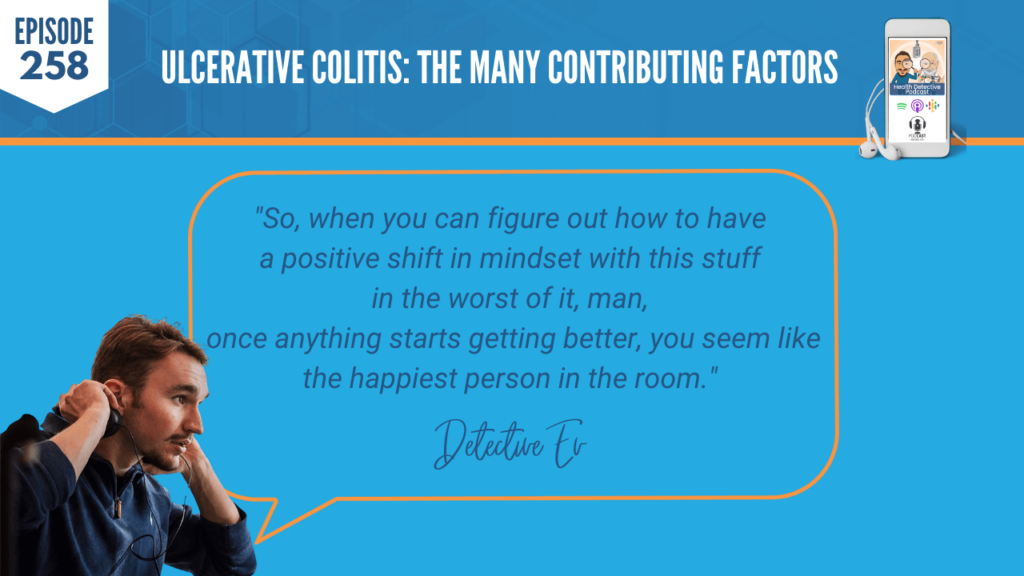
So, when you can figure out how to have a positive shift in mindset with this stuff in the worst of it, man, once anything starts getting better, you seem like the happiest person in the room. These are skills that are worth pursuing. All of it takes time. It’s never easy. I don’t want to sugarcoat it.
Where to Find Tina Haupert
The best things in life require some work, right? If it was easy, what’s the reward? You have to have the contrast to know how good it is.
So, where can people find you? And I also have to ask, even though we’re at the 50 minutes please, why Carrots ‘N’ Cake? What does that mean exactly for a business about health? I’m curious.
[00:48:08] Tina Haupert: Carrots ‘N’ Cake started 15 years ago, but it really is all about balance and finding that balance. I started my blog to lose weight for my wedding day, that was the goal 15 years ago. But it’s still very much my approach. You know, you’re having your carrots, but you should also have your cake too.
And as my father-in-law says, life’s too long to not enjoy the foods that you like and do what you enjoy. It’s very much about finding that balance and having that realistic approach to it all. I’m not very dogmatic with anything really. Honestly, I’m very moderate on my approach. But yeah, Carrots ‘N’ Cake. It’s also a little bit of fun too. We have fun as well.
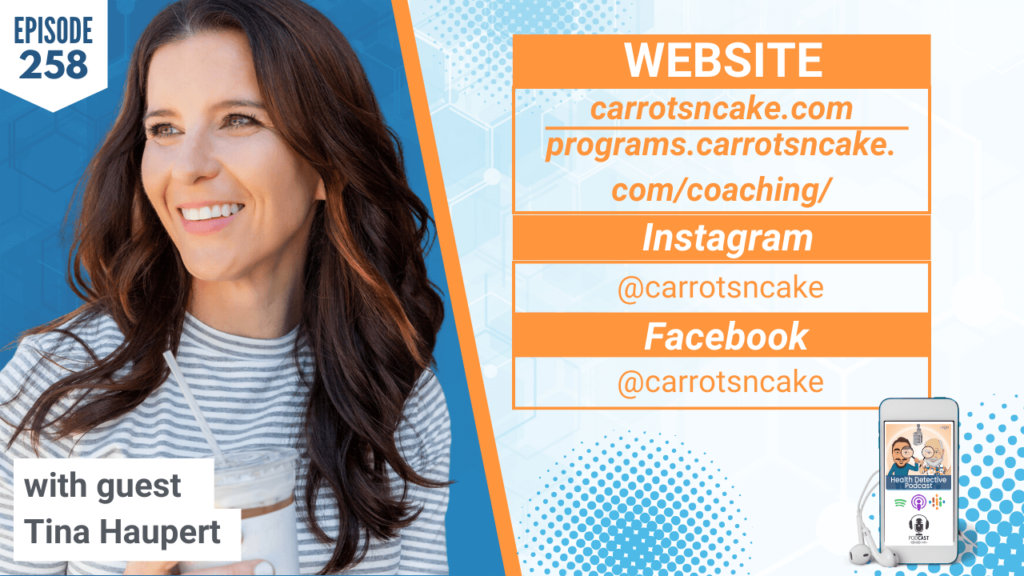
[00:48:43] Detective Ev: So, is it carrotsncake.com then where people can find you?
[00:48:55] Tina Haupert: Yep. So, carrotsncake.com. I have the podcast also called Carrots ‘N’ Cake, and I spend a decent amount of time on Instagram, so you could find me there.
I also have a cookbook. It’s called The Everything Diet Macro Cookbook. It’s on Amazon, Barnes & Noble. But if you’re somebody that’s into the whole macro thing or you’re just into not spending a lot of time cooking, all the recipes are super straightforward, no weird ingredients that you have to run to the grocery store for. Very straightforward recipes, easy and simple.
Signature Podcast Question – Clean Water
[00:49:14] Detective Ev: I’m that exact same way. My girlfriend’s always so nice, she cooks a ton of stuff for us. It’s the fanciest thing ever. And I’m like, can I just have my beef with mustard and sweet potatoes? She’s like, you just had that yesterday. I’m like, I’m a simple man. You know, I appreciate this but my gosh, this is so fancy.
Awesome. I have my signature question for you for the podcast. And I apologize cause I basically gave you a question that’s so similar to this. If it’s the same answer, no worries at all. But the signature question that we always finish on is from a general perspective of health, so not just UC.
If we gave you a magic wand and you could get every single person in this world to either start doing one thing for their health or you could get them to stop doing one thing, it could be either of those things, what is the one thing that you’d get them to do?

[00:50:01] Tina Haupert: This has been a hot topic with some of my clients. It’s probably just making sure your water is clean. Maybe you live in an area where the water is just not great, and you drink water every day. You need to hydrate yourself, cook with it, shower with it. You’re constantly having it go into your body.
Your refrigerator filter is probably not doing anything unless you have a really fancy refrigerator. And your Brita filter probably hasn’t been changed or it’s really not filtering out what it needs to. That would be something, if you have the money or you care about clean water, go there first. And I see some crazy stuff on the HTMA.
Conclusion
[00:50:44] Detective Ev: Excellent. Well, thank you so much for joining us today and being so transparent, telling us where you’re at with the journey, telling us where you’re heading. I think that makes this podcast more useful than a lot of the ones that we’ve done. And not that those people didn’t try, but this is real. This is where someone’s probably at in their journey listening. So, thank you very much.
[00:51:13] Tina Haupert: Yeah, sure thing. Thank you for having me.
You can always visit us at functionaldiagnosticnutrition.com. Our Instagram handle is @fdntraining.
For more informational and functional health-oriented podcasts like this one, go to functionaldiagnosticnutrition.com/health-detective-podcast/.
To learn more about us, go to functionaldiagnosticnutrition.com/about-fdn-functional-testing/.


